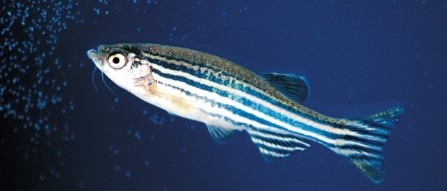When I began my summer work in Dr. Heather Stapleton’s environmental chemistry lab, I didn’t know exactly what to expect. I was told I would be hired as a member the Superfund Trainee Program, and that I would be working primarily with two of the lab’s Ph.D. candidates on their research with zebrafish. I actually worked next door to the Stapleton lab in the summer of 2011 for the Duke Wetland Center, handling general lab duties ranging from sample preparation to glassware cleaning. While it was a good experience, I was not consistently given what I considered truly impactful responsibilities. In contrast, last summer, by my second or third week in the Stapleton lab, I was spending my afternoons screening plates of zebrafish embryos dosed with various chemicals all on my own. It was rewarding to know that I lent a genuinely helpful hand to Dr. Stapleton’s research and the Superfund program at large.
As the weeks went on, I accumulated a basic (though still admittedly limited) understanding of the research for which I am assisting Dr. Stapleton’s Ph.D. candidates. The overarching focus of much of Dr. Stapleton’s research is investigating the human and environmental impact of chemicals used as flame retardants in consumer products as these chemicals leach out of those products over time. Many of these flame retardant chemicals are halogenated organic compounds, meaning that they are carbon-based compounds containing at least one atom of bromine, chlorine, or fluorine in their chemical structure. As part of Superfund Project 2, some of Dr. Stapleton’s Ph.D. students are specifically exploring how certain halogenated organic compounds used as flame retardants impact thyroid function. The chemical structures of some of these compounds and of the compounds formed when they are metabolized inside an organism are similar to the chemical structures of some thyroid hormones. Due to these structural similarities, it is suspected that the presence of these toxic chemicals may interfere with normal hormone activity, particularly when an organism is in the earlier stages of development.
Because zebrafish are relatively inexpensive, develop extremely quickly, have transparent embryos, and have had their entire genome sequenced, they provide a great model for testing the developmental effects of halogenated organic chemicals on the thyroid system and on the organism as a whole. Therefore, much of my time as a Superfund trainee was spent working with zebrafish. I learned how to feed the fish, how to breed the fish, how to harvest embryos, how to select good embryos for exposing to chemicals, how to expose the embryos properly, how to screen the embryos for defects, and how to properly euthanize the embryos when experiments end. I developed skills more quickly than I anticipated, but I still found myself with endless questions and at times only a basic understanding of what’s really going on with the science behind all of the research.
Last summer I was exposed to just a small sample of the simply incredible amount of time and effort necessary to carry out successful research. I saw how maddeningly frustrating the world of science can be (it can take weeks or months to get crucial analytical machinery fixed in a lab), as well as how rewarding it can be (just this week the Environmental Protection Agency has decided to further investigate flame retardants due to the weight of research suggesting their harmful effects – research that members of the very lab in which I’m working have significantly contributed to). I was around people who are passionate about what they are researching and excited about what they may discover, as well as people who are burned out and tired of the grind and repetition of science. It was a challenging learning experience for me as a Superfund Trainee, and ultimately I don’t think I will pursue a career in research. However, I have gained knowledge and skills this summer that will carry over into any environmentally related career I pursue, and it is for this reason that I count my time in this position as a success.
– Nick Tippens
Trinity ’12
B.S. Earth and Ocean Sciences





